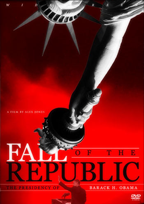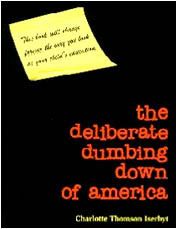There is an established legal principle that people should not have to repay their government's debt to the extent that it is incurred to launch aggressive wars or to oppress the people.
These "odious debts" are considered to be the personal debts of the tyrants who incurred them, rather than the country's debt.
Wikipedia gives a good overview of the principle:
- In international law, odious debt is a legal theory which holds that the national debt incurred by a regime for purposes that do not serve the best interests of the nation, such as wars of aggression, should not be enforceable. Such debts are thus considered by this doctrine to be personal debts of the regime that incurred them and not debts of the state. In some respects, the concept is analogous to the invalidity of contracts signed under coercion.
The doctrine was formalized in a 1927 treatise by Alexander Nahum Sack, a Russian émigré legal theorist, based upon 19th Century precedents including Mexico's repudiation of debts incurred by Emperor Maximilian's regime, and the denial by the United States of Cuban liability for debts incurred by the Spanish colonial regime. According to Sack:
When a despotic regime contracts a debt, not for the needs or in the interests of the state, but rather to strengthen itself, to suppress a popular insurrection, etc, this debt is odious for the people of the entire state. This debt does not bind the nation; it is a debt of the regime, a personal debt contracted by the ruler, and consequently it falls with the demise of the regime. The reason why these odious debts cannot attach to the territory of the state is that they do not fulfil one of the conditions determining the lawfulness of State debts, namely that State debts must be incurred, and the proceeds used, for the needs and in the interests of the State. Odious debts, contracted and utilised for purposes which, to the lenders' knowledge, are contrary to the needs and the interests of the nation, are not binding on the nation – when it succeeds in overthrowing the government that contracted them – unless the debt is within the limits of real advantages that these debts might have afforded. The lenders have committed a hostile act against the people, they cannot expect a nation which has freed itself of a despotic regime to assume these odious debts, which are the personal debts of the ruler.
Patricia Adams, executive director of Probe International (an environmental and public policy advocacy organisation in Canada), and author of Odious Debts: Loose Lending, Corruption, and the Third World's Environmental Legacy, has stated that:
by giving creditors an incentive to lend only for purposes that are transparent and of public benefit, future tyrants will lose their ability to finance their armies, and thus the war on terror and the cause of world peace will be better served.
A recent article by economists Seema Jayachandran and Michael Kremer has renewed interest in this topic. They propose that the idea can be used to create a new type of economic sanction to block further borrowing by dictators.
- Odious debt is an established legal principle. Legally, debt is to be considered odious if the government used the money for personal purposes or to oppress the people. Moreover, in cases where borrowed money was used in ways contrary to the people’s interest, with the knowledge of the creditors, the creditors may be said to have committed a hostile act against the people. Creditors cannot legitimately expect repayment of such debts.
The United States set the first precedent of odious debt when it seized control of Cuba from Spain. Spain insisted that Cuba repay the loans made to them by Spain. The U.S. repudiated (refused to pay) that debt, arguing that the debt was imposed on Cuba by force of arms and served Spain’s interest rather than Cuba’s, and that the debt therefore ought not be repaid. This precedent was upheld by international law in Great Britain v. Costa Rica (1923) when money was put to use for illegitimate purposes with full knowledge of the lending institution; the resulting debt was annulled.
The Bush and Obama administrations have also oppressed the American people through spying on us - even before 9/11 (confirmed here and here) - harassment of innocent grandmothers and other patriotic Americans criticizing government action, and other assaults on liberty and the rule of law. See this. The monies borrowed to finance these oppressive activities are also odious debts.
The government has also given trillions in bailouts, loans, guarantees and other perks to the too big to fails. These funds have not helped the American people. For example, the giant banks are still not loaning. They have solely gone into speculative investments and to line the pockets of the muckety-mucks in the form of bonuses. PhD economist Dean Baker said that the true purpose of the bank rescues is "a massive redistribution of wealth to the bank shareholders and their top executives". Two leading IMF officials, the former Vice President of the Dallas Federal Reserve, and the the head of the Federal Reserve Bank of Kansas City have all said that the United States is controlled by an oligarchy. PhD economist Michael Hudson says that the financial “parasites” have killed the American economy, and they are "sucking as much money out" as they can before "jumping ship". These are odious debts.
Bush, Cheney, Paulson, Geithner, Summers and others who ordered that these debts be incurred must be held personally liable for them. We the American people are not responsible to creditors - such as China, Saudi Arabia - who have knowingly financed these illegal and oppressive activities which have not benefited the American people, but solely the handful of corrupt politicians who authorized them.
Note: Of course, many mom and pop American investors hold U.S. treasury bonds as well. The size of their haircuts on U.S. bonds might - under a strict reading of the principle of odious debt - depend on whether or not they knew of the unlawful and oppressive activities of the U.S. government. Arguably, small individual investors tend to be much less knowledgeable about such matters than other countries such as China or Saudi Arabia.
Source











